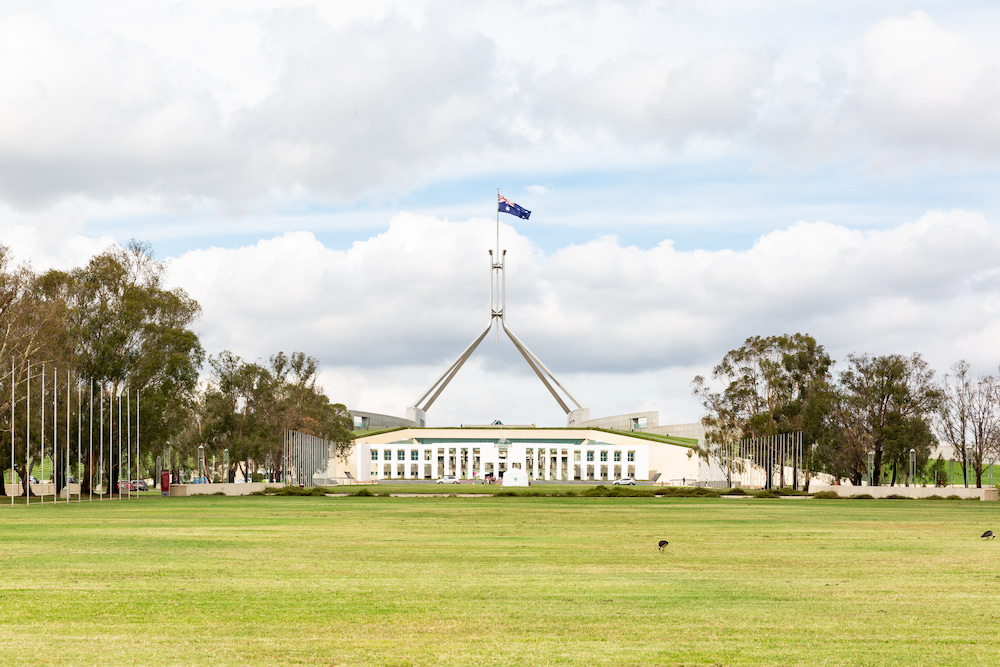The Federal Government has set a target that by 2030, 82 per cent of Australia’s energy will come from renewable electricity. But some in regional Australia claim renewables are environmentally damaging, and want the government to stop.
The National Rally Against Reckless Renewables, to be held outside Parliament House on the first sitting day of the year, Tuesday 6 February, from 10am, will call on the government to conduct a Senate inquiry into renewables; to suspend all renewable energy projects, including “unreliable, unaffordable, and environmentally destructive wind turbines, solar farms, and high-voltage transmission lines”; and to lift the ban on nuclear power.
“Many regional communities … are directly and adversely affected by the Australian Government’s reckless rollout of ‘renewables’,” rally organisers say.
“This is a national grassroots call for a responsible and sustainable approach to our energy future. We urge the Australian government to prioritise the well-being of our environment, communities, and the future of our nation.”
Organisers expect thousands of people to travel from regional and coastal Australia to take part.
Although organisers describe the rally as a coalition of grassroots community groups united under the National Rational Energy Network (which seems to be a Facebook page with 1,144 members), it appears to be associated with the political right and climate sceptics.
The rally’s demands echo National Party leader David Littleproud MP’s calls for the “reckless” 82 per cent renewable energy target to be paused; for a Senate inquiry into renewables; and for Australia to adopt nuclear power.
The speakers at the event include prominent figures from the United Australia Party (Senator Ralph Babet and former MP Craig Kelly), the National Party (Barnaby Joyce MP and Senator Matthew Canavan), One Nation (Senators Pauline Hanson and Malcolm Roberts), Katter’s Australian Party (Bob Katter MP), and the Liberal Party (Senators Jacinta Nampijinpa Price and Gerard Rennick).
A spokesperson for Chris Bowen MP, Minister for Climate Change and Energy, said: “While we respect everyone’s right to protest, we won’t accept the Opposition’s attempt to whip up a scare campaign on Australia’s energy transition after their decade of denial and delay undermined our energy security and affordability.”
Rally’s demands
Through the $20 billion Rewiring the Nation program, part of the Powering Australia plan, the federal government intends to modernise the electricity grid and infrastructure, lowering power prices and providing renewable energy to cities, towns, and regional communities.
But the rally organisers say that almost all the 1,000 new renewable projects are located in regional Australia, and that communities have not been properly consulted.
“In the lead-up to most of these ‘projects’, this government has conducted short, insincere, and unacknowledged community consultation. Exploiting the fact that most of these projects are located in or near coastal, farming, and traditional communities with small populations, the government continues to disregard our concerns. In many cases, our right to judicial review or appeal has or will be removed.
“Australian consumers, taxpayers, and industries require an electricity network that is efficient, safe, reliable, secure, and affordable. It is critical for Australia, now and in the future, to establish a network that does not damage our unique environment, particularly productive agricultural land, fisheries, and native habitats.
“This government’s reckless rollout of ‘renewables’ poses a significant threat to our nation, threatening food production for Australians and 80 million consumers globally. Our fauna and flora are facing unprecedented destruction, as hundreds of thousands of hectares of land and ocean floors are being deforested and/or damaged. It is posing a threat to our economy, costing over $121 billion. There are documented serious supply chain and sustainment issues, and therefore reliability risks, potentially leading to mass blackouts. Massive taxpayer subsidies and electricity bills will flow offshore for decades to the many ‘greenwashed’ multinationals lined up for these subsidised ‘investments’.”
The rally will call for an urgent Senate Inquiry to scrutinise the technical veracity and the “excessive” economic, social, and environmental costs of renewables, and the “escalating risks” to the country’s national interest and security. This includes Department of Climate Change, Energy, the Environment, and Water projects such as the Capacity Investment Scheme, Rewiring the Nation, Offshore Wind Projects, and expanding “unelected overreaching” organisations including the Australian Renewable Energy Agency (ARENA), the Climate Change Authority, the Clean Energy Finance Corporation, the Australian Energy Market Operator (AEMO), the Commonwealth Scientific and Industrial Research Organisation (CSIRO), and the Clean Energy Council.
Until such a Senate Inquiry reports, the rally wants the Council of Australian Governments (COAG) Energy Council to request all states and territories to suspend wind, solar, hydro, and associated transmission construction.
The rally also wants Australia to adopt nuclear power. “Nuclear energy has the lowest overall greenhouse gas emissions of any energy source as a result of its low land footprint, low material usage, and low waste output,” organisers say. “The current ban is archaic, restraining Australia from achieving a strong reliable energy future.”
However, research from the Australian Energy Market Operator published this week shows that a significant increase in renewable energy generation for the last quarter of 2023 led to a 48 per cent decrease in wholesale electricity prices from the same period in 2022. National Electricity Market emissions and emission intensity reached all-time record lows.
“The Albanese Government is working with regional communities and local landholders to ensure they benefit from cleaner, cheaper and more reliable energy,” a spokesperson for Mr Bowen said.
“It’s the regions that have always powered Australia that have the most to gain from this transformation and our government is helping them seize the opportunity.”



